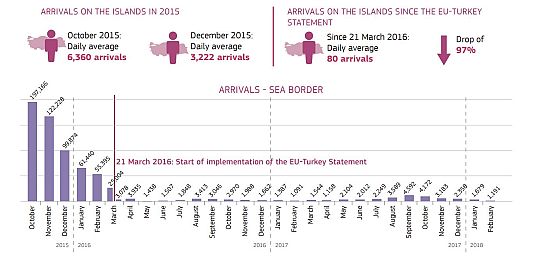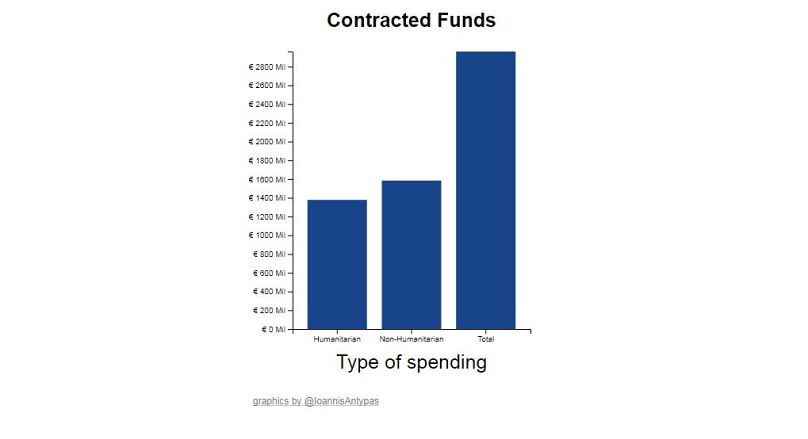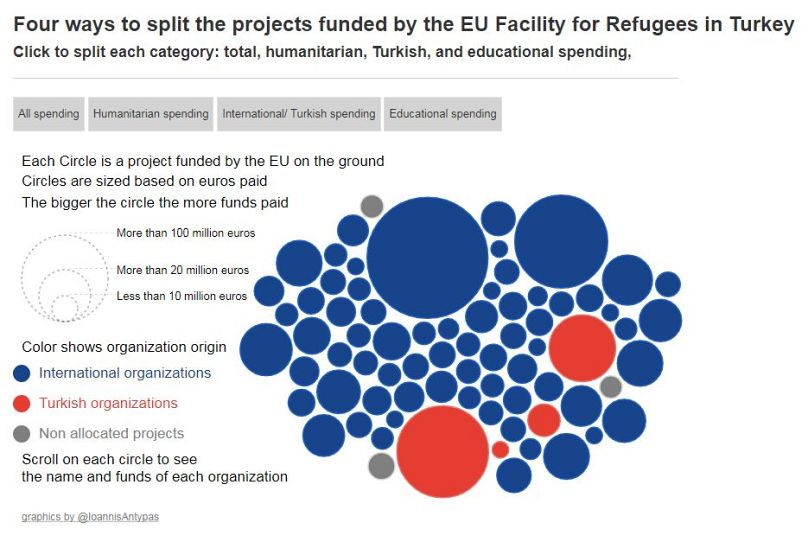The EU has hailed the 2016 deal struck with Turkey to stem the flow of migrants a success, but Erdogan’s government accuses the bloc of falling short on its promises. Ahead of the two sides meeting to discuss the second instalment of funding, Euronews dug into the data.
One year on from the EU-Turkey deal struck to ease the flow of migrants into Europe, the two sides are preparing to meet over the second round of funding, but their verdicts on the agreement diverge.
For its part, the European Commission hails the deal struck a success, with Johannes Hahn, Commissioner for European Neighbourhood Policy and Enlargement Negotiations telling Euronews that the project “has delivered results, seeing how the figures of immigration went significantly down and the EU delivered on its projects”.
Turkey’s President Recep Tayyip Erdogan is less positive, however, complaining about delays in the payment of the €3 billion agreed for humanitarian and other projects since 2016.
“What’s delivered to us so far is 179 million euros. What’s promised is three billion euros,” Erdogan said six months after the deal was signed.
More recently the Turkish ministry for EU affairs stated that “When the needs of Syrians are considered, it is very clear that the EU needs to be much quicker at fulfilling its commitments”.
The Refugee Research Center in Turkey (GAV), also notes that the first tranche of EU funding has been slow, and urged Turkey to press the EU to accelerate the process for future contracts.
European Commission data analysed by Euronews shows how 38 percent of the money allocated has not yet been paid. At a meeting on Monday in Varna, the two sides will discuss how to distribute the second half of the €6 billion package.
Commission Hahn admits that there is still significant work to be done to complete the projects already agreed, claiming that implementation was slowed because of delays in communication of needs from the Turkish side. He says he believes these issues have now been resolved.
Further analyzing the EU Facility
We then analyzed the entire first tranche of EU funding, breaking it down project by project to see just how the funds were spent as a whole, where did they go, and how much Turkey received.
Total funding; Effective enough?
At first look the project scale is impressive, 75 projects on the ground, totaling €3 billion in contracted funds.
The biggest player is the United Nations’ World Food Program, with more than one billion euros allocated to their flagship program, the Emergency Social Safety Net. It is implemented jointly with the Turkish Red Crescent and in collaboration with the Turkish government. It provides monthly transfers (of around €30 per person per month, plus quarterly top-ups) to the most vulnerable refugees such as women or unaccompanied children.
A refugee expert in Turkey who spoke to Euronews on the condition of anonymity, claimed that the European Commission does not monitor the role of the Turkish government closely, nor enforce sufficient transparency over the use of funds.
According to that field expert, after passing via the Turkish Red Crescent then through larger NGOs and lastly to local NGOs operating on the ground. She argues that in the end of this process the refugees receive only 5 to 6 percent of the intended EU funding.
An EU official contacted by Euronews dismissed those numbers as “completely false”, claiming only a “small part is incurred as costs by the implementing partner, for example for staff to monitor and implement the funding.”
Far fewer funds for Turkish organizations
Another important cause of friction is over the amount of money contracted to Turkish organizations. International organizations receive the lion’s share of funds allocated. European sources close to the matter pointed out that the Turkish government’s initial goal was that all money should be channel through them and spending decisions should be made in Ankara. This did not come to pass.
Humanitarian and non-humanitarian spending
The funds that the EU Facility for refugees has contracted so far in humanitarian and non-humanitarian spending are roughly equal. Humanitarian spending is mostly aimed at alleviating the immediate needs of the millions of migrants and refugees crossing the Syrian border, focusing heavily on cash transfers, the protection of vulnerable people, and transportation.
Non-humanitarian spending helps on capacity building and assisting with the integration of migrants, providing healthcare, education, and employment training
Both the the EU and Turkey have a common interest in supporting education to ensure that migrants and refugees have means and incentives to stay in Turkey. Commissioner Hahn stressed that thanks to the work of the EU Facility for Refugees, over 300,000 refugees have permanent access to education.
Euronews’ research suggests that educational projects received almost €550 million from the first tranche of funding, compared with around €1.3 billion for other programmes = humanitarian and non-humanitarian.
However, Turkey’s Refugee Research Centre points out that with around half of the 3.5 million registered refugees in the country under the age of 18, much more needs to be done.
The successes and challenges of the first half the EU-Turkey deal will play only a part in the discussions taking place in Varna. The needs of the refugees are another factor, but political considerations also weigh heavily.
As Commissioner Hahn pointed out, Turkey’s intervention in Syria is a concern for the EU because it is “becoming less and less a proxy war, and those engaged now have their boots on the ground”, threatening to create new groups of refugees. While for Turkey, the EU has dragged its feet on visa liberalisation amid warnings about the country’s human rights record.
Interactive data-visualisations by Ioannis Antypas














